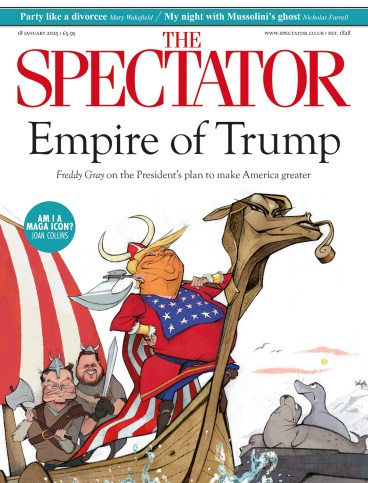
I long to write less about Rachel Reeves and more about world-beating British businesses – such as Brompton, the folding bicycle maker whose fortunes I have followed since I bought the product and interviewed the founder-designer, Andrew Ritchie, 20 years ago.
The latest Brompton news was that profits collapsed from £11 million in 2023 to breakeven for the year to March 2024 in the teeth of a post-pandemic demand slump; and that additional hiring has been put on hold after Labour’s NI increase added ‘hundreds of thousands of pounds’ of extra costs. A move from cramped west London premises to a new base at Ashford in Kent, with room for big increases in output and skilled jobs, had already been deferred to 2029.
Meanwhile, the chief executive Will Butler-Adams warned that a proposed axing of tariffs on imports of Chinese bikes – as a quid pro quo for more UK access to China, which happens to be Brompton’s biggest export market – would do deep damage to his already beleaguered operation. ‘I don’t need the government to back me,’ he told the Financial Times. ‘I just don’t need them to kill me.’
Let’s hope he made that plain to Chancellor Reeves during her recent trip to Beijing, when she had the temerity – despite everything her government has done to hobble entrepreneurial businesses like Brompton – to commandeer its shop for a shameless photo-opportunity.
Bordering on contempt
Anyone who thinks pragmatic give-and-take trade relations with China’s leaders must be a good thing because we can sell them private schools, Scotch whisky and Stilton cheese, as well as folding bikes, should watch the YouTube video of Yinan Zhu’s appearance last week before Westminster’s business and trade select committee.
Zhu is general counsel for Shein, the Chinese-founded fast-fashion retailer that aspires to list on the London stock exchange – and whose garments have been alleged to contain cotton produced by forced Uighur labour in Xinjiang province. Poker-faced, she repeatedly stonewalled questions on anything to do with Shein’s supply chains. The committee chairman, Liam Byrne MP, described her performance as ‘frankly border[ing] on contempt’, but kept proceedings courteous. What a pity Margaret Hodge, famed for her select-committee blasting of tax-avoiding tech multinationals, wasn’t there to give Zhu both barrels.
CBI resurgent?
‘Who speaks for pie factories if the CBI goes down?’ I asked in April 2023, when the employers’ lobby group was crippled by allegations of sexual misconduct. ‘The taint is life-threatening: if members flee, the CBI won’t survive.’ And few tears would be shed if it didn’t, because critics were saying the organisation had already lost its claim to speak for what remained of British industry.
But that voice is needed all the more now, as private-sector firms face multiple Labour assaults in the form of NI and minimum wages rises and costly new workplace rules. And the CBI (which still represents 170,000 businesses) looks ready for a comeback. The director-general Rain Newton-Smith is fluent and media-friendly, if circumspect. The chairman Rupert Soames, by contrast, is as robust as you’d expect of a veteran industrialist and Churchill grandson, having long shaken off youthful notoriety as the Oxford undergrad who brought the phrase ‘hog-whimpering drunk’ into popular use.
Soames’s gravelly exposition on Monday’s Today programme was compelling as to why his struggling members won’t hire and invest to drive the growth that Downing Street otherwise has no clue how to stimulate. We need to hear much more from him.
Beware crypto sharks
In deep France for a short break, I’m tuned to a media narrative about ‘bond vigilantes’ driving government debt yields to new peaks and forcing radical public spending cuts. Just like home; except that amour propre is particularly offended by the hefty spread – 85 basis points and rising – of French over German yields, despite Germany’s own economic problems. And among my neighbours, the fear is that the cuts will reach right down to subsidy-hungry rural communes like ours.
At least no one is talking about Elon Musk. But another global peril has reached even these countryfolk. At a friend’s house, there’s a hesitant tap on the door: Jacques, a local boar hunter who keeps his hat on throughout the visit, has come to ask my host, a former banker, for financial advice. Did he agree with France’s richest man, the luxury–goods tycoon Bernard Arnault, that cryptocurrencies offer a golden path to fortune? Non, we replied in unison, they’re pure gambling chips. But tell us your cautionary tale…
Six months ago, Jacques had a flutter on a crypto fund which is showing a spectacular profit on the trading app in his phone. But when he tried to cash out, he had a call from a UK mobile number telling him he must first pay several thousand euros’ worth of ‘income tax’ on his winnings, via a UK digital bank and in accordance with a letter addressed to him from HMRC.
‘C’est sûrement une escroquerie,’ we said in unison, once we’d found the French for ‘scam’. Ten minutes’ laptop research revealed that Jacques’s chosen trading platform, operated from Cyprus, had provoked more than 1,800 posts from worried customers on a chat site called BrokerChooser; that the nominated bank is not UK-registered and reveals no location anywhere; that the ill-written letter from HMRC’s ‘Solicitor’s Office’ was a blatant fraud, there being no such thing as income tax on crypto trading profits; and that there are reports of Arnault’s image being pirated to promote ‘cyber-escrocs’.
Enthusiasts foresee bitcoin rising in the Trump era from its current price of around $93,000 to as high as $250,000. But there are sharks in those waters. The moral of Jacques’s story must be prenez garde, mes amis, wherever you are.








Comments